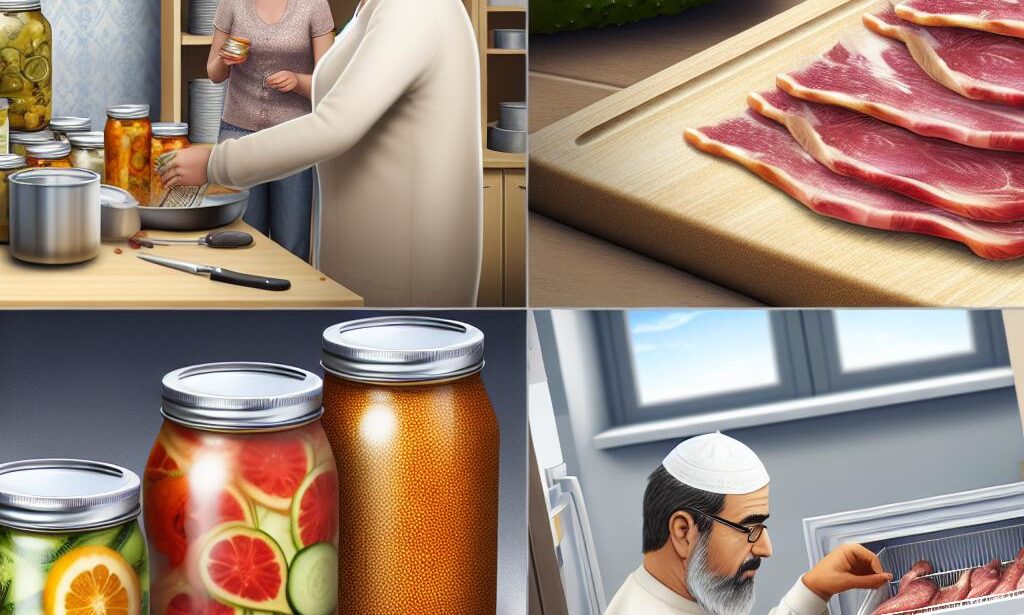In times of crisis or natural disasters, having a plan for preserving food can be essential for ensuring the well-being of yourself and your loved ones. Emergency food preservation is a key strategy that can help you maintain a supply of nutritious food during challenging circumstances. In this article, we will explore some important strategies for preserving food in emergency situations, providing you with the knowledge and tools necessary to be prepared for any unforeseen events.
Table of Contents
- Key Strategies for Emergency Food Preservation
- Understanding the Importance of Proper Food Storage
- Effective Techniques for Extending Shelf Life
- Essential Tools and Supplies for Food Preservation
- Tips for Safely Preserving Food in Emergency Situations
- Q&A
- In Summary
Key Strategies for Emergency Food Preservation
When it comes to emergency food preservation, there are several key strategies that can help ensure your food stays safe and edible for an extended period of time. One important strategy is canning, which involves sealing food in jars or cans to prevent spoilage. This method is great for preserving fruits, vegetables, and meats.
Another effective strategy is dehydration, which involves removing moisture from food to prevent the growth of bacteria and mold. Dehydrated foods can last for months or even years when stored properly. Freezing is also a popular method for preserving food in emergencies, as it can help maintain the quality of food for an extended period of time.

Understanding the Importance of Proper Food Storage
Proper food storage is essential for ensuring the safety and longevity of your food supply, especially in emergency situations. By , you can effectively preserve your food for extended periods of time. One key strategy for emergency food preservation is to utilize airtight containers to prevent moisture and air from spoiling your food.
Another important aspect of proper food storage is maintaining the correct temperature for different types of food. For example, perishable items like meat and dairy products should be stored in the refrigerator or freezer to prevent bacterial growth. Additionally, storing food in a cool, dark place can help prolong its shelf life. By following these key strategies, you can ensure that your emergency food supply remains safe and edible for when you need it most.

Effective Techniques for Extending Shelf Life
When it comes to emergency food preservation, there are several effective techniques that can help extend the shelf life of your food supplies. By utilizing these key strategies, you can ensure that you have access to safe and nutritious food during times of need.
One important technique is canning, which involves sealing food in jars or cans to prevent spoilage. This method is particularly effective for preserving fruits, vegetables, and meats. Another useful technique is dehydration, which involves removing moisture from food to inhibit the growth of bacteria and mold. Dehydrated foods can last for months or even years when stored properly.
Additionally, freezing is a popular method for extending the shelf life of perishable foods such as meat, poultry, and dairy products. By storing food at freezing temperatures, you can slow down the growth of bacteria and preserve the quality of the food. It’s important to properly package and label frozen foods to maintain their freshness.

Essential Tools and Supplies for Food Preservation
When it comes to emergency food preservation, having the right tools and supplies on hand is crucial. Whether you’re facing a power outage, natural disaster, or simply want to stock up on preserved foods for the future, being prepared is key. Here are some essential items to have in your food preservation toolkit:
- Canning Jars: Glass jars with airtight lids are perfect for canning fruits, vegetables, and jams.
- Pressure Canner: For preserving low-acid foods like meats and vegetables, a pressure canner is a must-have.
- Dehydrator: Dehydrating fruits, vegetables, and meats is a great way to preserve food without the need for refrigeration.
- Vacuum Sealer: Vacuum sealing food in bags or containers helps to extend its shelf life by removing air and sealing in freshness.
Additionally, having a good supply of salt, sugar, vinegar, and spices on hand can help enhance the flavor and preservation of your preserved foods. Don’t forget to label and date your preserved items for easy identification and rotation. With the right tools and supplies, you can ensure that you have a stockpile of delicious and nutritious foods to rely on in times of need.

Tips for Safely Preserving Food in Emergency Situations
During emergency situations, it is crucial to know how to safely preserve food to ensure you have access to nourishing meals. Here are some key strategies to help you effectively store and preserve food in times of crisis:
- Stock up on non-perishable items: Make sure to have a supply of canned goods, dried fruits, nuts, and other non-perishable items that have a long shelf life.
- Use proper storage containers: Store food in airtight containers to prevent contamination and spoilage. Mason jars, plastic containers, and vacuum-sealed bags are good options.
- Rotate your stock: Regularly check the expiration dates of your emergency food supply and rotate items to ensure you are consuming the oldest items first.
| Food Item | Shelf Life |
|---|---|
| Rice | Indefinite |
| Canned Beans | 2-5 years |
| Dried Pasta | 1-2 years |
Q&A
Q: Why is emergency food preservation important?
A: Emergency food preservation is important to ensure that you have access to safe and nutritious food during times of crisis or disaster when fresh food may not be readily available.
Q: What are some key strategies for emergency food preservation?
A: Some key strategies for emergency food preservation include canning, dehydrating, freezing, and pickling. These methods can help extend the shelf life of food and prevent spoilage.
Q: How can I safely preserve food in an emergency situation?
A: To safely preserve food in an emergency situation, it is important to follow proper food safety guidelines, use clean equipment, and store food in a cool, dry place. It is also important to rotate your food supply regularly to ensure that you are consuming the oldest items first.
Q: What types of foods are best for emergency food preservation?
A: Foods that are high in acidity, such as fruits and pickled vegetables, are best for emergency food preservation. These types of foods are less likely to spoil and can be safely preserved using methods such as canning or pickling.
Q: How long can preserved food last in an emergency situation?
A: The shelf life of preserved food in an emergency situation can vary depending on the method of preservation used and the type of food being preserved. Generally, canned foods can last for 1-5 years, dehydrated foods can last for 6 months to 1 year, and frozen foods can last for several months to a year. It is important to regularly check the expiration dates on your preserved foods and rotate your supply as needed.
In Summary
In conclusion, understanding key strategies for emergency food preservation is essential for ensuring food security during times of crisis. By following proper techniques such as canning, freezing, and dehydrating, you can prolong the shelf life of your food supplies and reduce the risk of spoilage. Remember to always prioritize safety and hygiene when preserving food for emergencies. With the right knowledge and preparation, you can rest assured that you and your loved ones will have access to nutritious food when it is needed most. Stay informed, stay prepared, and stay safe.

